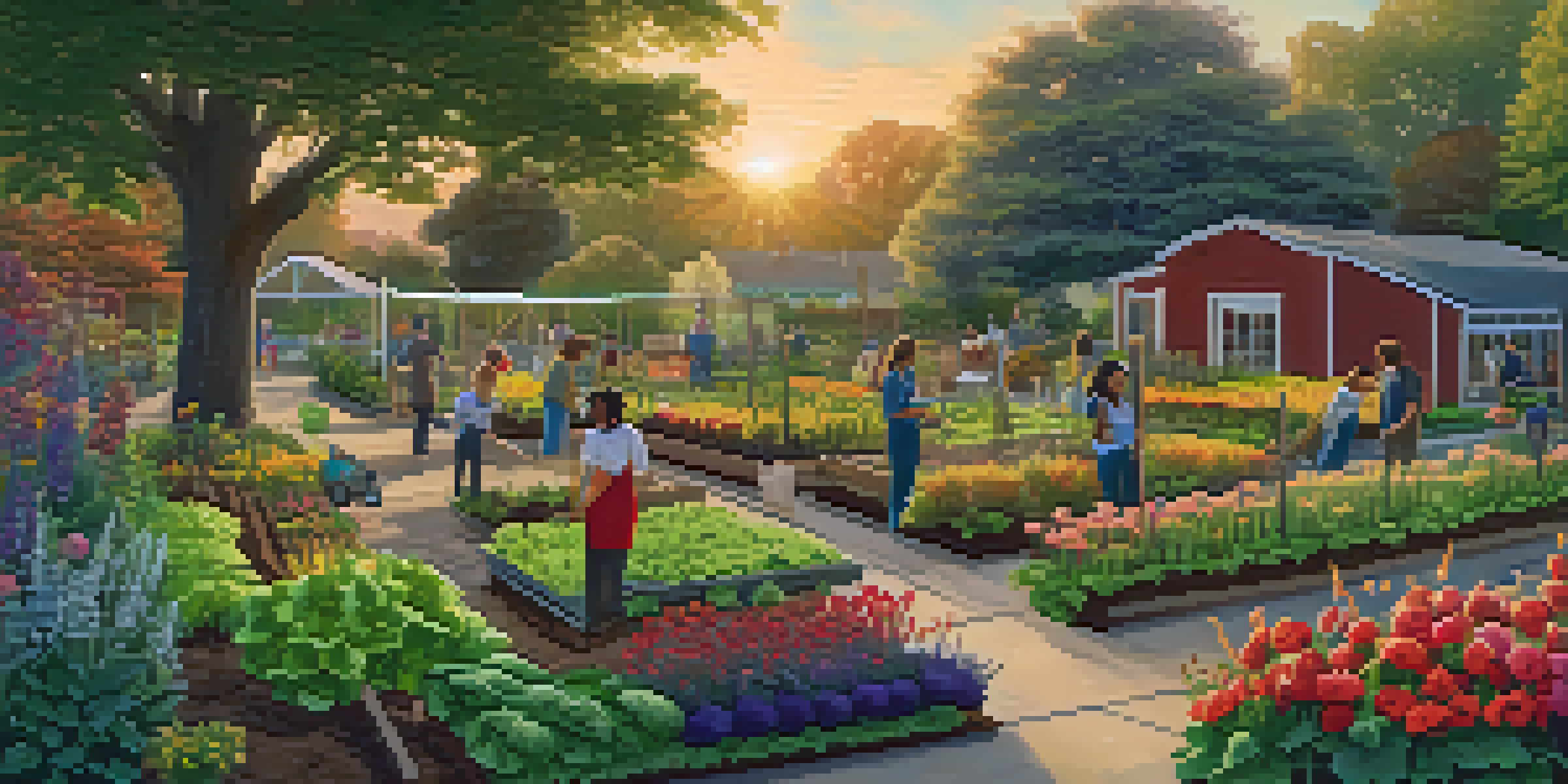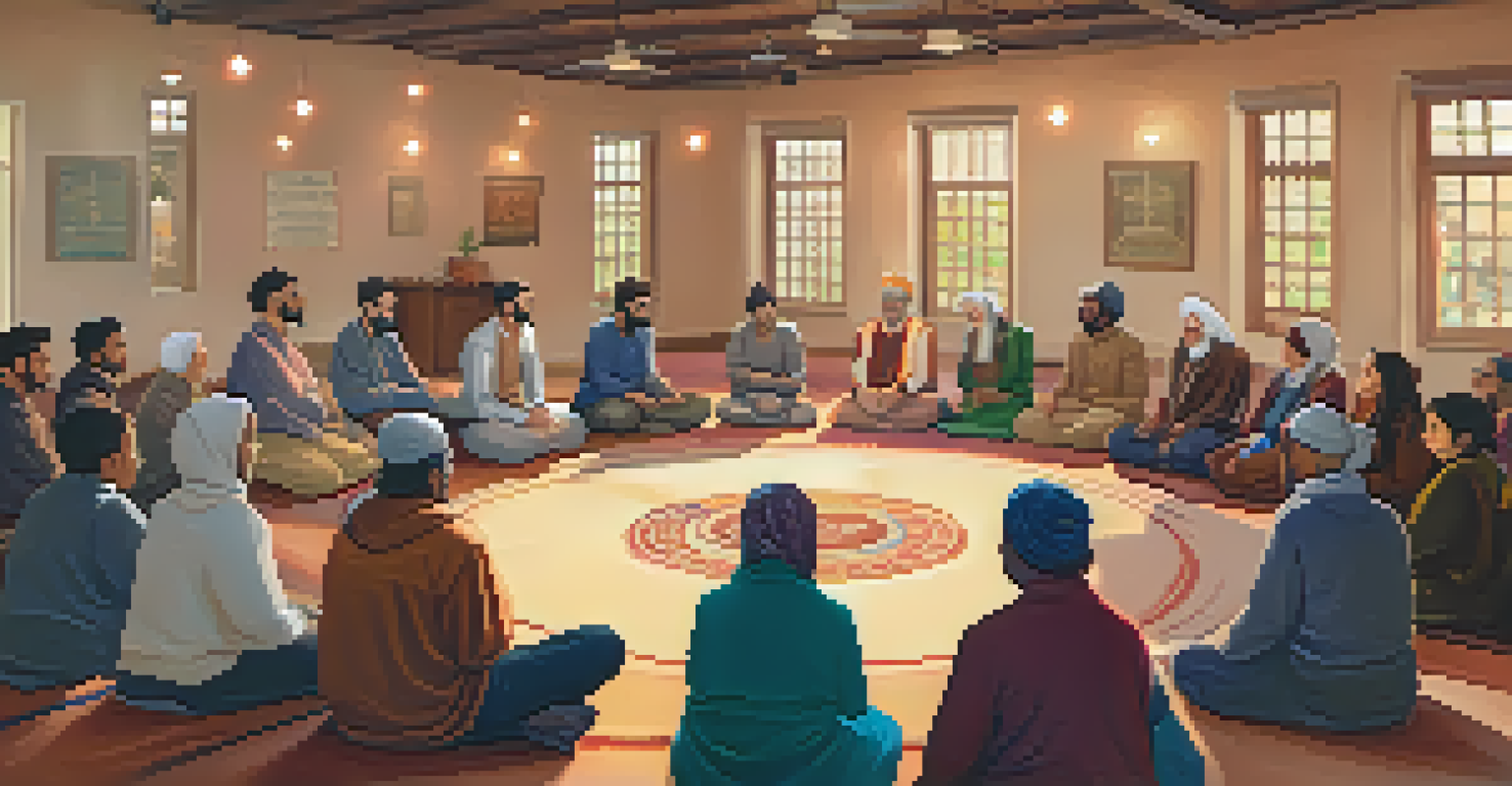Community Resilience Through Shared Spiritual Practices

Understanding Community Resilience and Spirituality
Community resilience refers to the ability of a group to withstand and recover from challenges. It’s about how communities bounce back from adversity, whether that be economic downturns, natural disasters, or social strife. Spirituality plays a crucial role in this process, providing individuals with a sense of purpose and connection to something larger than themselves.
The greatness of a community is most accurately measured by the compassionate actions of its members.
When people come together in shared spiritual practices, they create a supportive network that fosters emotional well-being. This collective engagement not only strengthens personal faith but also nurtures relationships among community members. Such connections are essential in times of crisis, as they provide both emotional and practical support.
Moreover, spirituality often emphasizes values such as compassion, empathy, and cooperation. These values can be the foundation for resilient communities, encouraging members to support one another and work collaboratively in the face of challenges. By fostering a shared spiritual identity, communities can unite their strengths and resources to overcome obstacles.
Examples of Shared Spiritual Practices in Communities
Shared spiritual practices can take many forms, from regular group prayers and meditation sessions to community rituals and celebrations. For instance, many faith-based organizations organize events like communal meals or interfaith dialogues, creating spaces for individuals to connect and share their beliefs. These gatherings not only enhance spiritual growth but also build trust and understanding among diverse community members.

Another example is the practice of community gardening, which can have both spiritual and practical benefits. Participants often find a deeper connection to nature, fostering mindfulness and gratitude while also working together towards a common goal. Such activities can strengthen community bonds and enhance resilience by promoting cooperation and shared responsibility.
Community Resilience Through Spirituality
Spirituality fosters connections and support within communities, enhancing their resilience in the face of challenges.
Additionally, some communities engage in collective storytelling, where members share personal experiences related to their spiritual journeys. This practice can be a powerful tool for healing and understanding, as it allows individuals to empathize with one another and recognize shared struggles. Through storytelling, communities create a rich tapestry of experiences that reinforce their collective identity.
The Role of Rituals in Strengthening Community Bonds
Rituals are a vital aspect of many spiritual traditions, offering a structured way for communities to connect and reflect. Whether it’s a weekly worship service, a seasonal festival, or a simple gathering for meditation, these rituals provide a sense of continuity and stability. They remind members of their shared values and beliefs, reinforcing their commitment to one another.
Resilience is accepting your new reality, even if it's less good than the one you had before.
Participating in rituals together can create a deep sense of belonging and identity among community members. For instance, celebrating cultural or religious festivals as a group fosters a sense of pride and collective memory. These shared experiences are essential for building resilience, as they empower individuals to face challenges together as a united front.
Moreover, rituals often serve as a source of comfort during difficult times. They can provide a framework for processing grief, loss, or uncertainty, helping communities to navigate their emotions collectively. By coming together in times of need, communities can draw strength from their shared spiritual practices, enhancing their resilience.
Mental Health Benefits of Shared Spiritual Practices
Shared spiritual practices can significantly enhance mental health and emotional well-being. Engaging in collective rituals or activities fosters a sense of belonging, reducing feelings of isolation. This connection is particularly important in today’s fast-paced world, where many individuals struggle with loneliness and anxiety.
Research has shown that spiritual engagement can lead to lower stress levels and improved mental health outcomes. By participating in community practices, individuals often find solace and support, allowing them to cope better with life’s challenges. These practices can serve as a buffer against mental health issues, promoting resilience in individuals and communities alike.
Shared Practices Build Stronger Bonds
Engaging in shared spiritual practices, such as rituals and community activities, strengthens relationships and fosters a sense of belonging.
Additionally, shared spirituality often emphasizes gratitude and mindfulness, which are powerful tools for enhancing mental well-being. When community members practice gratitude together, they cultivate a positive outlook and reinforce their connections. This shared focus on mental health can create a ripple effect, encouraging individuals to prioritize their well-being and support one another.
Creating Inclusive Spaces for Diverse Spiritual Practices
In diverse communities, it’s essential to create inclusive spaces that honor different spiritual practices. By fostering an environment of respect and understanding, communities can embrace their diversity while building resilience. This inclusivity not only enriches individual experiences but also strengthens communal bonds.
One effective way to create inclusivity is to organize interfaith dialogues and events that celebrate various spiritual traditions. These gatherings provide opportunities for individuals to share their beliefs and practices in a respectful setting. They promote understanding and help dispel misconceptions, fostering a spirit of unity amidst diversity.
Moreover, embracing different spiritual practices can enhance community resilience by broadening perspectives and encouraging collaboration. When individuals learn from one another, they develop greater empathy and understanding. This shared learning experience can empower communities to address challenges collectively, leveraging their diverse strengths.
The Impact of Technology on Shared Spiritual Practices
In recent years, technology has transformed the way communities engage in shared spiritual practices. Online platforms and social media enable individuals to connect with like-minded people, regardless of geographical barriers. This digital connectivity can enhance community resilience by fostering relationships and support networks beyond physical boundaries.
Virtual gatherings, such as online prayer groups or meditation sessions, have become increasingly popular. These platforms allow individuals to participate in spiritual practices from the comfort of their homes, making it easier to stay connected. As a result, communities can maintain their bonds even in challenging times, such as during a pandemic.
Inclusivity Enhances Community Strength
Creating inclusive spaces for diverse spiritual practices promotes understanding and collaboration, ultimately bolstering community resilience.
However, it's essential to strike a balance between online engagement and in-person interactions. While technology offers convenience, it cannot fully replace the sense of community that comes from shared physical spaces. Encouraging a blend of both approaches can help communities maximize their resilience while fostering deeper connections.
Looking Ahead: Strengthening Community Resilience Together
As we look to the future, it’s crucial for communities to prioritize shared spiritual practices as a tool for resilience. By fostering connections and supporting one another, communities can better navigate the challenges that lie ahead. Emphasizing the importance of spiritual engagement can empower individuals and strengthen collective bonds.
Communities can take proactive steps by organizing regular gatherings, workshops, and discussions focused on shared spirituality. Encouraging participation from diverse groups can enrich these practices, fostering a sense of belonging for everyone involved. Collaborative efforts can lead to innovative solutions for community challenges, enhancing resilience.

Ultimately, the journey toward building community resilience through shared spiritual practices is a collective endeavor. By coming together, individuals can draw strength from one another, creating a vibrant tapestry of support, understanding, and hope. Together, we can foster resilient communities that thrive in the face of adversity.